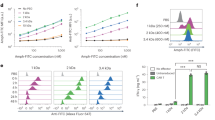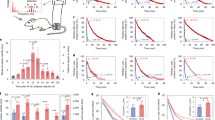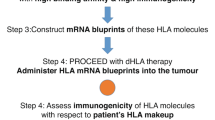Abstract
TUMOUR-SPECIFIC antigens (TSTA) have been demonstrated by transplantation methods in tumours induced by carcinogens and an important feature is that each tumour possesses characteristic individual antigens1–4. Host resistance can be evoked against these tumours after exposure to viable or attenuated tumour cells, whereas isolated tumour fractions have usually been devoid of immunogenic activity5,6. Tumour-specific antigens with individual specificities similar to those demonstrable by transplantation methods have recently been detected on aminoazo dye induced rat hepatoma cells. An indirect fluorescent antibody test8 was used based on that developed by Möller9 for the detection of histocompatibility antigens associated with the cell membrane. This in vitro procedure provides a more simple test than tedious transplantation methods for assaying the anti-genicity of subcellular fractions from transplanted rat hepatomas. Particular attention has been paid to plasma membrane fractions prepared by the general method of Davies and his co-workers which was initially devised for the isolation of mouse H-2 isoantigens10,11 and more recently applied in the extraction of transplantation antigens from human spleen12.
This is a preview of subscription content, access via your institution
Access options
Subscribe to this journal
Receive 51 print issues and online access
$199.00 per year
only $3.90 per issue
Buy this article
- Purchase on Springer Link
- Instant access to full article PDF
Prices may be subject to local taxes which are calculated during checkout
Similar content being viewed by others

References
Sjögren, H. O., Prog. Exp. Tumor Res., 6, 289 (1965).
Prehn, R. T., Fed. Proc., 24, 1018 (1965).
Green, H. N., Anthony, H. M., Baldwin, R. W., and Westrop, J. W., An Immunological Approach to Cancer, 165 (Butterworths, London, 1967).
Klein, G., Cancer Res., 28, 625 (1968).
Old, L. J., Boyse, E. A., Clarke, D. A., and Carswell, E., Ann. NY Acad. Sci., 101, 80 (1962).
Baldwin, R. W., Barker, C. R., and Moore, M., Rep. Brit. Emp. Cancer Campaign, 45, 258 (1967).
> Baldwin, R. W., Barker, C. R., Intern. J. Cancer, 2, 355 (1967).
Baldwin, R. W., and Barker, C. R., Brit. J. Cancer, 21, 793 (1967).
Möller, G., J. Exp. Med., 114, 415 (1961).
Haughton, G., and Davies, D. A. L., Brit. J. Exp. Pathol., 43, 488 (1962).
Nathenson, S. G., and Davies, D. A. L., Ann. NY Acad. Sci., 129, 6 (1966).
Sanderson, A. R., and Batchelor, J. R., Nature, 219, 184 (1968).
Wolf, A., and Klucis, E. S., Rep. Brit. Emp. Cancer Campaign, 45, 70 (1967).
Author information
Authors and Affiliations
Rights and permissions
About this article
Cite this article
BALDWIN, R., MOORE, M. Isolation of Membrane-associated Tumour-specific Antigens from Rat Hepatomas induced by Aminoazo Dye. Nature 220, 287–289 (1968). https://doi.org/10.1038/220287a0
Received:
Issue Date:
DOI: https://doi.org/10.1038/220287a0
This article is cited by
Comments
By submitting a comment you agree to abide by our Terms and Community Guidelines. If you find something abusive or that does not comply with our terms or guidelines please flag it as inappropriate.


